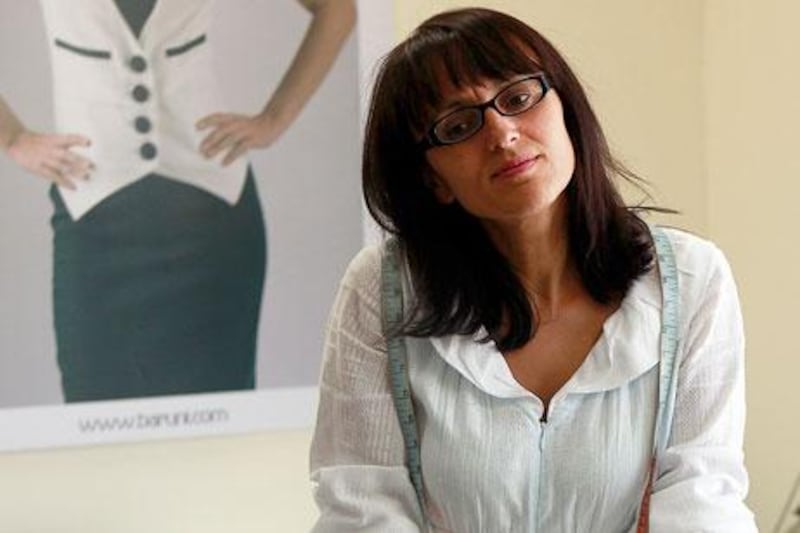The Dubai-based fashion designer Fadwa Baruni talks to Rebecca McLaughlin-Duane about her decision to change careers and designing with Libya in mind
Thoughts of her Libyan homeland are never far from Fadwa Baruni's mind. The country's recent liberation even provided inspiration for select outfits from the fashion designer's autumn/winter collection, which debuts on the catwalk at Dubai's Wafi Mall this evening.
Those who attend can expect to see black, white, green and red.
"I started the collection a year ago and I have chosen to use the colours of the new Libyan flag in some pieces," she says. "That's my contribution to the new Libya."
Having lived and worked in Dubai for five years, Baruni's circle of friends includes mostly foreigners: she believes this is a natural consequence of Muammar Qaddafi's rule.
"Under Qaddafi it was really, really terrible, but thankfully things are changing and I'm really optimistic about the future," she says. "The mood is now completely different and I'm hopeful there will be a stronger Libyan community. Before, if you didn't know the family or their connections you kept your distance in case they were pro-Qaddafi.
"The other day when I was shopping in Carrefour, I overheard a couple speaking with a Libyan accent," she says. "So I congratulated them on the liberation and the reception was great! They're even coming to my show."
Having burst on to the UAE fashion scene back in 2009, Baruni's label of the same name has featured signature monochrome tones and become synonymous with classic tailoring.
Her latest collection signals a departure from the traditional black-and-white cocktail dresses, peplum and frill-cuffed shirts and palazzo pants seen previously. Increasingly, accents and block colours are entering Baruni's palette, a move triggered by a private client base that has grown to more than 300.
"Of course, I still like black and white very much and that will continue to be a theme, but it can also have its limitations. And when my customers say 'can you do this same dress in a colour?' of course I want to satisfy them. So I've introduced royal blues, chocolate browns and burnt orange for autumn and winter."
The collection, dubbed "When Amy Meets Mad Men" is a nod to Baruni's passion for the soulful tunes of the late, great Amy Winehouse, and her recent discovery of the US cable series Mad Men.
"I'm not a great TV watcher, but I am totally addicted to it!" she says. "I adore the 1950s and 1960s fashion - there was a certain class and originality to it and my collection was definitely inspired by that. The models will also be wearing Amy-like hairstyles, as I was very touched when she passed away."
As with her previous collections, this latest line makes good use of natural fabrics and blends of silk, cotton and wool sourced from the subcontinent, Europe and the Far East. When it comes to the mass production of her designs, Baruni keeps it local, using a manufacturer in Sharjah also favoured by the leading labels Jaeger, Windsmoor and Hobbs.
The designer is well on her way to fulfilling big-league ambitions, with the label growing in size and stature every year. She has agents in London and New York, soon to include Canada, and after this collection is launched it will be swiftly on to the next.
With a four-and-a-half-year-old daughter in tow, Baruni is an early riser who often burns the midnight oil. One of seven children herself, family is all important and she would not have it any other way:
"As I'm away in the studio all day, when I come home I love to work at the kitchen table with Naima, my daughter, playing nearby" she says. "I basically took over the table with pieces of paper everywhere, meaning my husband John went out and bought a really huge table we could use for eating as well. And now I'm slowly invading that space too!" she laughs.
Baruni's daughter is already showing signs she might follow in her mother's fashionable footsteps. Whether she is reaching for pin boxes during private fittings for friends and family at Baruni's villa in the Meadows or pointing out clothes she likes in magazines, Naima is most definitely cut from the same cloth.
"Maybe when she's around six years old I'll buy her a small sewing machine." Baruni says, grinning. "I can't wait!"
Baruni says her own interest in design started young as well, fostered by her "very fashionable" mother.
"She'd give us things to embroider and my sisters were not interested - I was the black sheep. Through high school and university I was always copying pieces I would see in magazines and even remodelling my own clothes using my mother's machine. So I knew I was good at cutting and tracing from a very young age."
Before Naima embarks upon her career in fashion, however, Baruni wants her to earn an academic degree, as she herself did in Libya and Scotland.
"My family saw I was good at maths and chemistry, so it was either engineering or medicine for me. And I don't regret it, it was a great experience and it absolutely gave me the base for what I'm doing now. Besides, my clothes are very structured - I use clean lines, and I think it's because I studied engineering."
Baruni went on to spend eight years working as a petroleum engineer. But it was the death of her mother in 2002 that marked a turning point, propelling her to shift gears and follow her passion.
"I suddenly felt life was very short and I had to do exactly what I wanted," she says.
After studying art and fashion in the UK and later in the UAE, Baruni launched her own label and never looked back, despite the challenging economic environment. The meaning of her surname, after all, roughly translates to "leader of the group".
"I started the business in the worst global recession and it was very tough, but I don't regret a thing. I love it, I still enjoy it."
Baruni faced adversity of a different kind with the opening of her first store in Libya last year.
"If it's not recession, it's war," she shrugs. "Just six months after we opened the shop on Tripoli's main street, Gargaresh, the war started. We never officially closed; business was on and off at first and then people simply didn't have money to spend, as they weren't even being paid. In the end there was no water or electricity and my stock couldn't reach the shop - so it had to close."
On the heels of the establishment of the National Transitional Council the boutique has reopened and Baruni is exploring the possibility of franchising her business in Benghazi.
Dubai, however, will remain her family base and headquarters for her business for the foreseeable future. She will celebrate the emirates' diversity tonight, with 11 residents chosen from a 200-strong database of volunteers modelling her creations.
"I think this is a great new start for Libya, but Dubai is home now and I honestly think this place is really amazing," she says. "I felt welcome from the very first year I moved here."
Catch Baruni Couture's autumn/winter 2011 collection at Dubai's Wafi Mall tonight from 7pm. Go to Paramour Boutique or visit www.baruni.co for more information.





